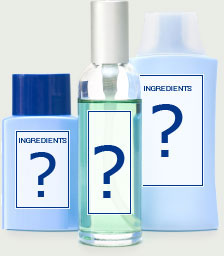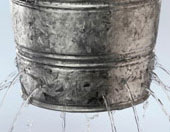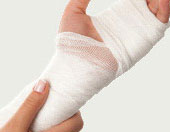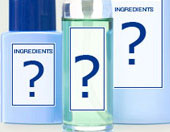
Cosmetics health hazards:
Before you use that next bottle of shampoo, deodorant or toothpaste, you may want to look inside...
Posted in General Health articles on August 22, 2011. Last modified on February 01, 2018. Read disclaimer.
Did you shower and shampoo today with petrochemicals? Did you cleanse your face and style your hair with ingredients known to cause cancer and birth defects? Chances are that the answer is "yes," whether you know it or not.
The reality is that many of the brand-name products we use contain ingredients known to cause harm. How can this be? Because the manufacturers are policing themselves. While the Food and Drug Administration (FDA) is the main U.S. agency involved in personal products, the FDA's own web site states clearly, "Cosmetic firms are responsible for substantiating the safety of their products and ingredients before marketing."
"Cosmetics" covers a lot of ground
Everyone who bathes, washes their hair or brushes their teeth -- including children -- is affected by this issue, because "cosmetics" covers a lot of ground. To the FDA, cosmetics include toothpaste, shampoo, deodorants, moisturizers, perfumes, lipsticks, facial make-up and hair dyes.
+ Free Shipping & Returns on Eligible Items.
(*Amazon's Top 100 list updated hourly.)
Thanks to a growing consumer safety movement, it's possible to identify safer products. The Environmental Working Group runs an Internet-based directory that rates thousands of products at www.ewg.org/skindeep.
We apply an average of 126 unique ingredients to our skin every day, according to EWG. Here are some of the most common dangers:
- Phthalates. Industrial chemicals used in shampoos and hair sprays. They disrupt the hormone system, and are classed as water and air pollutants by the U.S. Environmental Protection Agency.
- Oxybenzone. Widely used in sunscreens, lip balms, lipsticks and moisturizers, this chemical has been linked to allergies, hormone disruption and cell damage according to the U.S. Centers for Disease Control.
- Triclosan. This is a pesticide that disrupts hormones. It's found in liquid hand soap and toothpaste, as well as children's toys.
- Ethylene glycol and propylene glycol. Favorites in shampoo, sunscreen and moisturizer, plus motor vehicle antifreeze and airplane wing de-icer. They've been linked with skin irritation, birth defects and organ damage.
- Parabens. Members of this chemical family are widely used as preservatives in thousands of cosmetics. They can disrupt the hormone system.
While it's impractical to avoid contact with all toxins, we can choose products that are safer.

 How happiness may improve health
How happiness may improve health Main causes and symptoms of dehydration
Main causes and symptoms of dehydration Preventing falls in the home
Preventing falls in the home Common health risks in cosmetics
Common health risks in cosmetics Avoiding stress and depression during the holidays
Avoiding stress and depression during the holidays Common causes of children's stomach aches
Common causes of children's stomach aches Tips for controlling sugar cravings
Tips for controlling sugar cravings